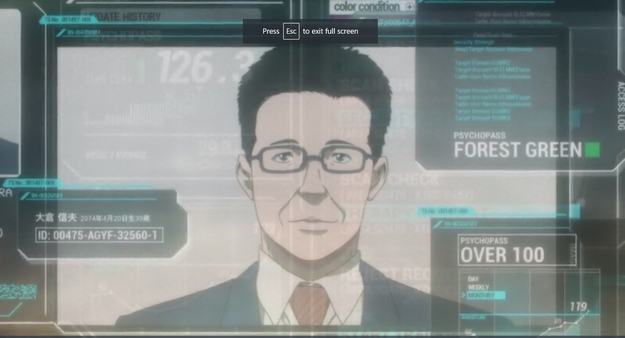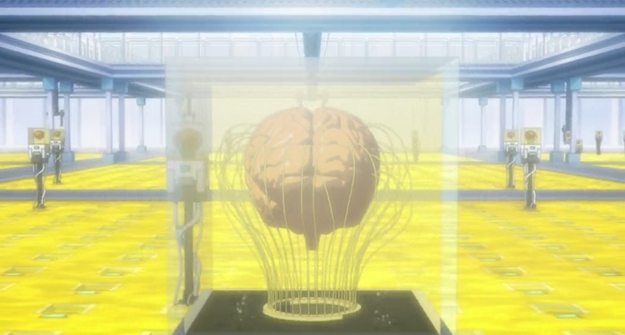It has become a norm in contemporary popular culture to represent law and government as mechanisms or apparatus for ubiquitous control. Due to the algorithmic forms of control that regulate our everyday life, such popular cultural representations often engender social critique, and reveal forms of ontological relations between human beings and technological beings. Here, I would like to bring into light an extreme example, the Japanese anime Psycho-pass. In this cyberpunk anime, the machine is not simply a metaphor for the revealed hidden structure of the law, but the law itself is reduced to a machine. Not only does the show represent the points of intersection between algorithmic technology and law, but also imagines scenarios in which the protagonists (as well as the antagonists) learn to play with the power of an algorithmic-juridical machine named Sybil.
Psycho-Pass is not simply an anime, but is also a conscious and self-referential theoretical art which often deploys contemporary philosophical concepts and theories in its attempt at interpreting its own world (and our world). Its story takes place in a dystopian Japan, which claims to have achieved something closest to a “perfect human society”. Sybil collects data regarding the psychological condition and behavioral patterns of each and every citizen in order to make decisions regarding their psychological profile and work-aptitude. Based on this information, it decides the career path of each citizen, classifies them into the categories of “citizens” and “latent criminals”, separates and imprisons those whose criminal co-efficiency it judges to have reached regulation level, and eliminates those it deems too abnormal to be helped by incarceration and therapy. It can be argued that, even though Psycho-Pass is set in a distant dystopian future, its representation of Sybil is also a reflection of the dominant paradigm of governmentality of our present in which law and technology have become intimately entangled (a situation that may proliferate in the coming days with the development of AI technology).
Both the protagonists and the antagonists of the series interpret Sybil as a system of perfect control, which alludes to the Deleuzian concept of the “society of control”. In a society of control, “the different control mechanisms are inseparable variations, forming a system of variable geometry the language of which is numerical (Deleuze, “Postscript” 4). On the other hand, Professor Saiga, a character from the anime, quotes Max Weber to describe the Sybil system as the “bureaucrat perfected” which controls society through firm command of knowledge and expertise. In Kogami’s (a protagonist) imagination, the main antagonist Makishima interprets Sybil as “the worst panopticon” by referring to Michael Foucault.
Foucault’s conception of “panopticon” represents a form of biopower that utilizes surveillance technology to discipline individual citizens and regulate social norms (Discipline 195-230). The paradigm of panopticon, however, does not help us to illuminate certain aspects of algorithmic control mechanisms that contemporary surveillance technologies utilize. Nor does it reveal the algorithmic mechanisms on which a system like Sybil is grounded. Unlike the guard at the central watch tower of the panopticon, Sybil is supposed to be free of human bias (at least that’s the fiction that is propagated). The anime is perhaps conscious of this limitation, thus it also the gives the name “panopticon” to another AI that preceded Sybil and has become redundant.
Perhaps, it would be beneficial to utilize Matteo Pasquinelli’s theoretical contribution to contemporary algorithmic biopolitics. In his own words: “Bringing Foucault to the age of artificial intelligence, we may say that after the periodization based on the passage from the institutional Law to the biopolitical norm, we now enter what we could provisionally define as the age of Pattern Recognition and Anomaly Detection (“Anomaly”). Sybil is also a machine that bases its decisions on algorithmic mechanisms of “pattern recognition” and “anomaly detection” – which, according to Pasquinelli, are the “two epistemic poles” of “algorithmic governance” (“Anomaly”).
However, Sybil’s power cannot be reduced to contemporary forms of biopower and algorithmic governance, since it not only regulates the social body through incarceration and therapy, but also uses its sovereign power to ruthlessly eliminate any individuals that it perceives as “threats”. For Foucault, sovereign power is an older form of governmental power, which is deductive in its essence, and represents the ancient regnal power over life and death. Biopower on the other hand, is a productive form of power. However, for Giorgio Agamben, biopower is nothing new, and the production of the biopolitical body which he calls bare-life (life that can be killed) is one of the original functions of sovereign power (Homo Sacer 11). He also often uses the term “juridico-political machine” in order to illuminate the technological dimensions of the political and legal regimes of our time.
Agamben is famous for claiming that the “state of exception” has become the dominant paradigm of government of our time. For him, the state of exception is also an “apparatus - whose purpose is to make the norm applicable by temporarily suspending its efficacy” (State of Exception 58). Which also means, the state of exception is a legal apparatus that makes it possible for the juridical machine to survive beyond its own suspension. Sybil fulfills the function of the judge, and also the role of the police to some extent. Juridical procedure is reduced to the decision taken by the guns named “dominator” which are connected to the core of the Sybil system. Sybil decides which criminal must be paralyzed and who must be eliminated, while a human personnel belonging to the police department pulls the trigger.
The ideological consent of the citizen that Sybil enjoys is grounded on the successful propagation of a fiction that it is an objective machine that judges rationally and without being influenced by subjective bias. Humanity no-longer needs to shoulder the burden of sovereign decisions. But already from the first episode, it is represented as a cruel and blind system that cannot separate between a criminal and his hostage. Its cymatic scan system, which is grounded on the measurement of the stress level of the citizens, ends up classifying both the captors and their hostages as criminals deserving the punishment of death. According to the fiction propagated by Sybil, such limitations are technological glitches and “emergency situations”, and the human officers and enforcers of the police department work as a safety net in order to overcome such technological limitations.
It can be argued that human lives are the main exceptions in the algorithmic-juridical system of Sybil. Already from the very beginning, it is revealed that the majority of the police department personnel are “enforcers”, who are themselves classified by Sybil as latent criminals. Enforcers are generally demoted police officers since, according to Sybil, their psychological profile matches that of a criminal. The police department uses them as “hunting dogs” rather than sending them to the isolation facility. The enforcers are the most visible sign of the anomie that is arrested within the nomos of Sybil. Gradually, we also learn that the police chief, Joshua Kasei, who is a humanoid avatar of Sybil, has the exceptional power of suspending the norms of Sybil and overriding the original judgement given by the dominators.
The most astonishing revelation regarding Sybil occurs in the final episodes with the gradual removal of the “final curtain” (a metaphor used by the hacker Gu-sung Choe) that guards the secret core of this machine. We learn that Sybil is not entirely artificial, but its central core is constituted by more than 200 human brains which once belonged to the most dangerous psychopaths of Japan. The criterion for the choice of such a brain is given to the scientific belief that psychopathic brains lack empathy and thus are capable of objective judgement devoid of emotions. Sybil categorizes such psychopathic individuals as “criminally asymptomatic”, as they do not show any symptoms in their cymatic scan while committing a crime.
Sybil cannot judge the so-called “criminally asymptomatic” even when they commit criminal acts under its surveillance, nor does it wish to judge. Rather, it only wants to “incorporate” their brains within the system in order to upgrade further. This is precisely why Sybil fails to judge the main antagonist Makishima, and instead of eliminating him, it puts all its resources into capturing him. The category of “criminally asymptomatic” turns out to be the name of the anomie that is inscribed within the very core of the nomos that is Sybil. Thus, it becomes clear that within Sybil’s paradigm of governance, nomos and anomie, as well as life and law – have become undecidable. In this way, Sybil’s governing paradigm crosses its path with the paradigm of state of exception. However, what is unique about Sybil’s paradigm is that, in it, life and technology also become undecidable. Here, Pasquinelli’s thought becomes relevant, for whom life and technology have entered into an undecidability in the concept of “apparatus” already since the development of German biophilosophy (“ What an” 79-89).
Towards the end of the first season, Sybil reveals its secret core to the main protagonist, Inspector Akane Tsunemori. But this self-disclosure is also addressed as an act towards its self-preservation. As Sybil realizes that it cannot permanently survive through fiction, it aims toward revealing itself to a human society that will willingly consent to its rule. It chooses Tsunemori as its first test subject, since even though she no longer believes in the functionality of the system, she is unwilling to dispose of it in fear of social collapse. In a way, we find ourselves in a similar situation to Tsunemori in relation to the juridico-political orders of our time, in which the state of exception has become a norm, and politics has found itself increasingly traumatized by the task of producing consent for the apparatus that helps law to survive beyond its own suspension.
A law that perpetuates after its own suspension becomes a figure of spectral law, and according to Agamben, characters from Franz Kafka’s novels often take part in playing with such a spectral law in order to deactivate them and to make new use of them (State of Exception 64). In the final episode, Tsunemori also learns to play with the spectral juridical machine, which is Sybil. Through her play with Sybil’s mechanism of exception, she manages to make new use of it. She persuades Sybil to grant her the power of temporary exception so that she can override the dominators' decision, in order to save Kogami’s life. In this case, both Tsunemori and Sybil use the legal terminology of “exception”. The same power of exception that Syabil originally utilized to make Kogami a fugitive and a killable bare-life, becomes the object of playful deactivation for Tsunemory, and is transformed into the exceptional power that can save Kogami’s life.
The law preserving formula that Tusnemory articulates in the final episode seems different from Walter Benjamin’s conception of “law preserving violence”, but its function is similar to the “law destroying violence” (Benjamin, “Critic of Violence”). According to Kogami’s summary of this formula, if everyone begins to believe that the law does not protect human beings, but it is human beings that protect the law - then a system like Sybil will disappear. Perhaps, through the character of Tsunemory, Psycho-pass gestures towards a coming subject that has the capacity of playing with and making new use of algorithmic-juridical machine of our time.
Works Cited
Agamben, Giorgio. Homo Sacer; Sovereign power and Bare Life, Translated by Daniel Heller-Roazen. Stanford University Press, 1998.
Agamben, Giorgio. State of exception. Translated by Kevin Attell. The University of Chicago Press, 2005.
Agamben, Giorgio. What is an Apparatus? and Other Essays. Translated by David Kishik and Stefan Pedatella. Stanford University Press, 2009.
Benjamin, Walter. “Critique of Violence”. Selected Writings, volume 1, 1913-1926. Edited by Marcus Bullock Michael W. Jennings. Harvard University Press, 2004.
Deleuze, Giles. “Postscript on the Societies of Control”. October, Vol. 59, The MIT Press, 1992.
Foucault, Michel. “Right of Death and Power over Life” The History of Sexuality Volume I: An Introduction. Pantheon Books, 1978.
Foucault, Michel. Discipline and Punish, The Birth of the Prison. Translated by Alan Sheridan. Vintage Books, New York, 1995.
Pasquinelli, Matteo. “What an Apparatus is Not: On the Archeology of the Norm in Foucault, Canguilhem, and Goldstein”. Parrhesia, Number 22, 2015.
Pasquinelli, Matteo. “Anomaly Detection: The Mathematization of the Abnormal in the Metadata Society”. January 29, 2015. http://matteopasquinelli.com/anomaly-detection/



